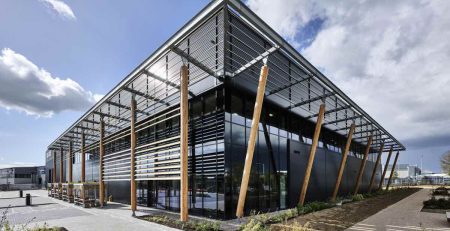What was The Buzz in June?
Here are a few of the stories that caught our attention in June. From using AI in workplace design to a call for climate regulation in planning, things in the world of real estate are changing.
Property companies ask government for regulation to make climate part of planning process
More than 100 companies from across the built environment are calling on the government to change regulation and make tackling climate change central to the planning process in the UK. In an open letter organised by the UK Green Building Council, the companies said aligning climate policy and planning policy would help the UK better meet its net-zero carbon targets and avoid confusion among planning departments and developers that is stymying the number of homes being built.
Among the signatories of the letter — addressed to, among others, Rishi Sunak, prime minister, and Michael Gove, the secretary of state for the Department for Levelling Up, Housing and Communities — are companies like Landsec, Grosvenor, Related Argent, BNP Paribas Real Estate UK, JLL, Colliers and Avison Young. Read more.
UK firms without flexible working ‘will struggle to hire in next five years’
UK firms without flexible working ‘will struggle to hire in next five years’, reports The Guardian. Natalie Campbell, co-chief executive of Belu Water and advocate of the four-day week, said: “I think the world has changed post-pandemic. People absolutely recognise that being visible, being seen at a desk, literally at the desk in front of a screen, does not deliver or make for a fully productive workforce. I think people have recognised that trying to shoehorn 19th-century Industrial Revolution-style ways of working on to jobs that go from knowledge economy right through to manufacturing and then through to the care system doesn’t work.”
Joe Ryle, the director of the 4 Day Week Campaign, said: “We live in a country which could be called Burnout Britain. We work some of the longest hours in the world, some of the longest in Europe, whilst also having one of the least productive economies.” Read more.
How flexible offices help businesses grow
A recent Knight Frank article looks at ‘How flexible offices could help your business grow’. “Flexible offices are one of the top office trends we’ve seen this year, helping many businesses take their operations to the next level — especially with the rise of flexible and agile working,” said the piece.
“As we navigate our way through a period of slowing growth and restricted spending, businesses need to spend their budget wisely and as effectively as possible. Whether it’s keeping costs low by only using what they need, wanting greater freedom with their lease arrangement or something else entirely, there are many reasons to explore the many great flexible offices on offer.” Read more.
How AI is helping architects change workplace design
AI is helping architects change workplace design, reported The New York Times. To address the changing landscape of work, firms like Zaha Hadid Architects have been turning to AI to help its architects design better office buildings, and spaces that cater to workers’ individual needs. “I’ve been a workplace designer for the last 24 years,” said architect Arjun Kaicker. “I’ve seen more change in the last 24 months than in the whole of my career.”
Historically, offices have been designed based on organisational charts to “see who reports to whom and which departments might need to sit next to each other,” said academic, author and activist in design, Jeremy Myerson. Today, with staff members both WFH and the office, “businesses just can’t afford to have swathes of real estate that are underutilised for the week,” he said. Many businesses are using algorithms and machine intelligence “to have a much more real-time, dynamic reading of what’s happening in the space.” Sensors track people and environmental conditions — temperature, air quality, noise levels, humidity, carbon dioxide levels and daylight. Architects and workplace designers then cross-reference that data to get a better picture of actual needs. Read more.
HSBC to move out of Canary Wharf headquarters due to hybrid working
HSBC is to move out of its global headquarters in Canary Wharf after more than two decades to considerably smaller offices in the City of London, in response to post-pandemic hybrid working arrangements and a cost-cutting drive.
The financial services giant, which had up to 8,000 staff at the 45-floor tower at Canada Square during peak times before the pandemic, is to move to the former head office of telecoms company BT near St Paul’s cathedral.
In 2021, HSBC announced its intention to reduce its office space around the world by nearly 40% post-pandemic to cut costs and respond to increased hybrid working. Read more.












